7 Tips to Reduce Fuel Costs for Your Fleet
Looking for ways to reduce fleet fuel costs? Check out these seven strategies that fleet managers can use to improve fleet fuel efficiency and save...
Home > Blog > Why the Benefits of Fleet Management Systems Are NOT Enough
Fleet ManagementLower costs, lower emissions, improved customer satisfaction, and improved safety are just some of the benefits of fleet management systems today.
Fleet managers in 2024 are under tremendous pressure to deliver.
Lower costs, lower emissions, improved customer satisfaction, and improved safety are just some of the demands that today’s fleet management professionals face.
That’s why so many are embracing technology to realise the numerous benefits of fleet management systems.
But as we’ll see, most fleet management platforms do not provide enough flexibility and power to give businesses today the edge. They’re jacks-of-all-trades, in a field where customers increasingly demand mastery.
Fleet managers are tasked with ensuring that a business’s delivery vehicles work as efficiently, quickly, safely, and cleanly as possible.
So fleet management covers a whole range of issues - from driver recruitment and driver behaviour to fuel use, vehicle maintenance, route planning, and performance measurement.
Vehicle fleets are extremely expensive assets, are very costly to run, and are critical to the work of any business that relies on moving goods from one place to another.
The first wave of digitalisation saw vehicle telematics take centre stage. Analogue tachographs for tracking vehicle speed, distance covered, and driver activities (like the one shown below) began to be replaced with equipment for collecting and transmitting data in real-time, like today’s Electronic Logging Devices (ELDs).
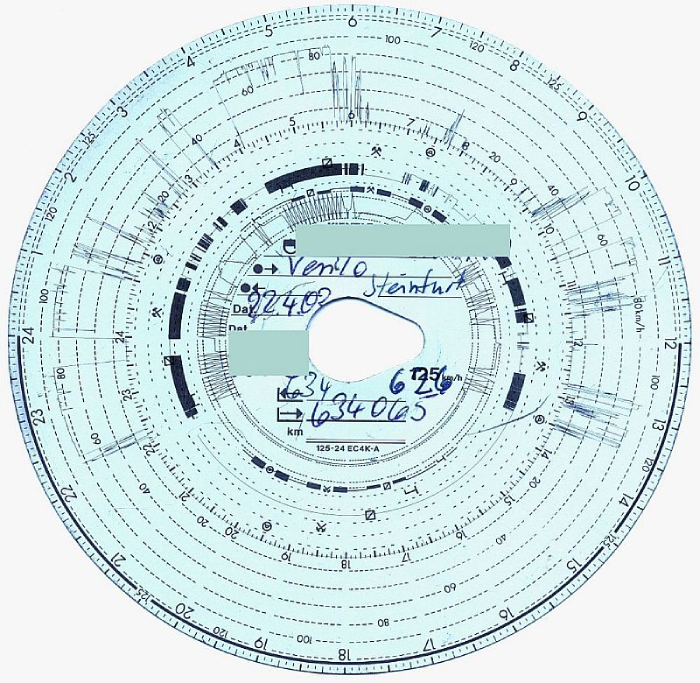
As technology has developed and moved into the cloud - making it possible to gather, send, and process data in ever greater quantities at ever greater speeds, even on the move - the possibilities it holds out to fleet managers have mushroomed.
But at the same time, so have the issues fleet managers have to deal with.
If we leave out the long-run questions of freight’s transition to electric vehicles or even autonomous vehicles, for the time being, fleet managers are confronted with four major challenges:
In the year ending June 2021, 1,390 people were killed on the UK’s roads - and 119,850 were injured.
The consequences for a business of being found to have been negligent when involved in serious road traffic accidents can be catastrophic in terms of cost and reputation.
So, ensuring that the vehicles that make up a fleet are safe, well-maintained, and kept in good order is a vital part of fleet managers’ roles.
That, and making sure that vehicles are used safely and responsibly.
As well as responsibility for the equipment itself, fleet managers’ safety concerns extend to processes (for example, loading and unloading, on-site movements) and personnel (driver training, incentivisation, and performance management, tracking compliance with route plans and ETAs, etc).
After safety, a fleet manager’s biggest concern is maximising efficiency - getting as much done with the available assets for as little cost as possible.
The cost question has several dimensions:
Diesel and petrol prices were already at record levels at the end of 2021. At the time of writing (May 2022) they had risen by between 25p and 30p per litre since then, according to Statista. While there’s very little that can be done to control this price volatility, fleet managers are expected to minimise costs by ensuring that fuel is used as efficiently as possible
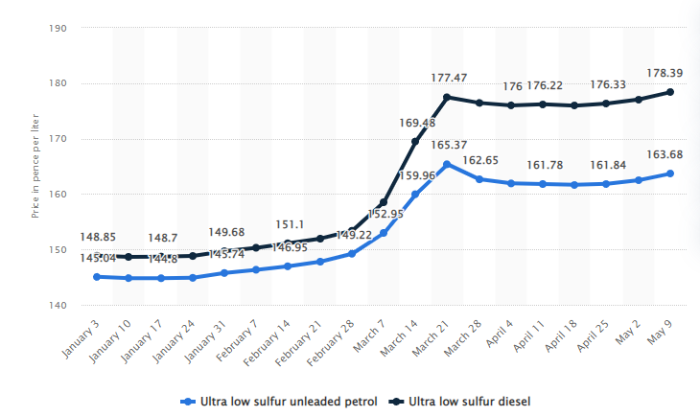
And yet, a recent survey by Verizon found that 53% of fleet managers don’t use technology to monitor fuel use.
Breakdowns and unscheduled maintenance not only put pressure on budgets. They also interfere with a business’s ability to deliver goods efficiently, slowing down operations and putting extra pressure on other parts of the fleet and the workforce.
Even little things can have a huge impact: driving on tyres below the recommended pressure has been found to decrease fuel efficiency by anywhere between 3% and 10%.
Fleet managers are expected to keep such unplanned events to a minimum through preventative maintenance and training in best use practice
A fleet that’s used inefficiently doesn’t just burn more fuel and put more wear and tear on vehicles than an efficient one. It also creates unnecessary wage costs - in driver hours and overtime, and also in back-office costs.
For example, recent studies have found:
Finally, fleet managers are often expected to plan for expansion and contraction of fleet capacity - acquiring and disposing of vehicles in response to demand.
Road transport produces around 10% of global C02 emissions. Businesses are facing ever-tighter controls on their environmental impacts, and fleet managers find themselves at the forefront of these changing requirements.
In the UK, for example, all new cars, vans, and lorries will be required to be “zero-emission at the tailpipe” by 2035.
Fleet managers need to concern themselves with the environmental performance of their vehicles - not just as a by-product of fuel use and costs - but as a central factor in its own right.
In late 2021, the UK’s Road Haulage Association calculated that the country had a deficit of around 100,000 qualified HGV drivers.
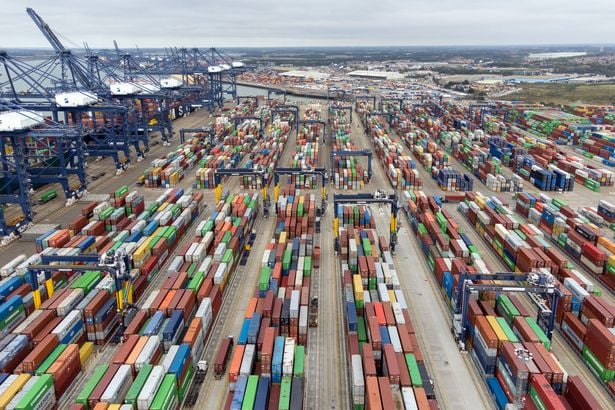
The situation has been complicated by Brexit and the restrictions placed on EU nationals driving lorries in the UK, but it’s a problem that is affecting many other countries around the world as well.
When experienced drivers are in short supply, it becomes even more important to use vehicles as efficiently as possible - so that more can be done with less. It also puts fleet managers under pressure to make sure that new drivers are hired and upskilled as quickly as possible.
There are a lot of different comprehensive fleet management solutions available that attempt to cover all or most of the areas discussed above.
At the high-cost end of the spectrum are services like Verizon Connect, Samsara, and Teletrac Navman.
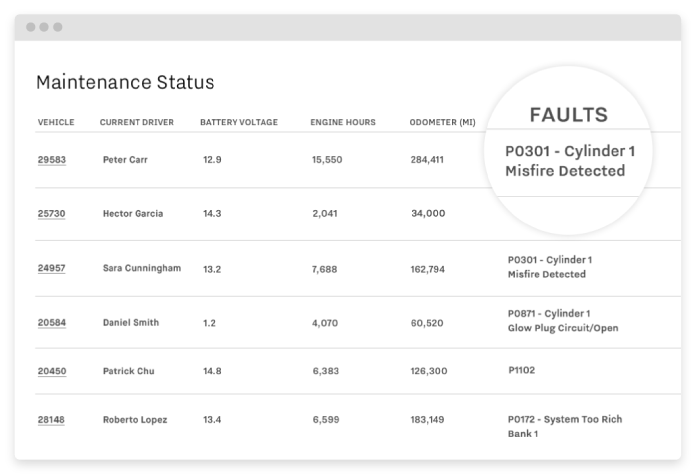
Each of these is reportedly priced in the area of £25-£40 / $30-$50 per month per vehicle and features:
Naturally, each has its strengths and weaknesses:
On top of cost, these comprehensive solutions all seem to have very long contract periods - which will make them even less appealing to smaller businesses, but for the more budget-conscious, there are cheaper all-in-one offerings, like Fleet.io and Trakm8, which start at around £4-£8 / $5-$10 per vehicle per month
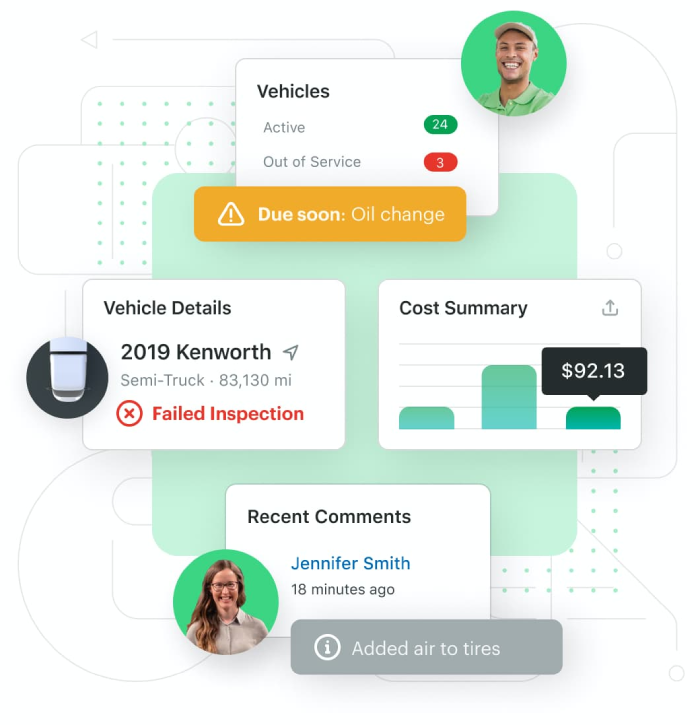
The cheaper services tend to be pure SaaS products that are not directly integrated into the fleet vehicles themselves (for example, via an ELD or hard-wired GPS).
A service like Fleet.io, for example, stores all of your telematics data, maintenance schedules, vehicle location information, etc - but it doesn’t generate it in the way that an industrial IoT solution like Samsara does.
Where Fleet.io has asset data, it’s from an asset database. You still need a telematics provider - for example - to report on the current state of each vehicle, as opposed to its factory specs.
The simple answer to this question is this: balanced excellence across every aspect of a fleet manager’s responsibilities.
As we’ve seen, fleet management is an exceptionally diverse discipline - so it’s hardly surprising that products that excel in one or more areas usually neglect or fall short in the others.
That’s why a growing number of fleet managers are opting for best-in-class point solutions - services like eLogii, which focuses solely on last-mile delivery - and using them to replace less sophisticated parts of their all-in-one systems.
Take a premium, all-in-one fleet management product like Samsara. Like eLogii, it offers route planning and optimisation. But on closer inspection of the product specifications, the limitations become painfully obvious:
That’s just one fleet management solution, but it is indicative of how far short of a dedicated last-mile delivery platform these all-in-one products tend to fall.
For example, eLogii:
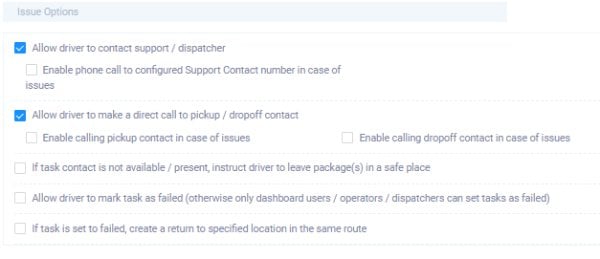
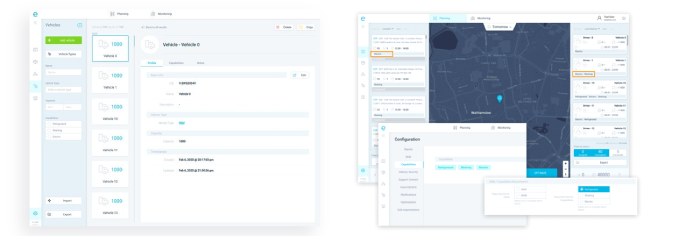
A fleet management system like Samsara monitors actual fuel consumption and can help users optimise this by highlighting inefficient behaviours like excessive idling, speeding, etc, and identifying vehicle and component failures that compromise performance.
But the shortcomings of its route and load optimisation features mean that potential savings are lost in terms of mileage, driver hours, and failed deliveries that have to be sent out again on subsequent days.
And that’s before the effects of customer experience are taken into account.
84% of customers say that they would be unlikely to use a business again after a bad delivery experience. And late or missed deliveries are one of the biggest causes of dissatisfaction. Rough ETAs with wide time windows are irritating to customers. But missed windows without dynamic notifications are even more annoying!
The close control over every variable and the ability to factor in changes on the fly (along with automated dynamic ETA notifications) mean that eLogii can ensure a great customer experience every time.
And with state-of-the-art webhooks and fully-documented API, eLogii can quickly and simply be integrated to work alongside any of the leading fleet management systems.

Whatever kind of business you’re running: if vehicles play a central part, then you ought to be taking advantage of the benefits of fleet management systems.
There are so many different options available for fleet managers, that it can be hard to know where to begin.
We get it: it’s tempting to opt for an all-in-one solution that says it does everything on its product spec page. But as we’ve shown in this blog, there can be huge differences between what products that claim to offer “route optimisation” (for example) actually provide.
Just looking at costs, as we have here, the savings to be made - and the enhanced customer experience that can be provided - make a strong case for supplementing your fleet management system with a dedicated last-mile delivery management platform such as eLogii.

Looking for ways to reduce fleet fuel costs? Check out these seven strategies that fleet managers can use to improve fleet fuel efficiency and save...
Learn the significance of unit cost in business. Discover how to calculate and reduce unit costs for improved profitability and efficiency.
Boost efficiency and profits with fleet optimization by using smart routes, automation, and proactive maintenance to cut costs and improve service...
Be the first to know when new articles are released. eLogii has a market-leading blog and resources centre designed specifically to help business across countless distribution and field-services sub sectors worldwide to succeed with actionable content and tips.
